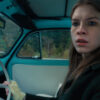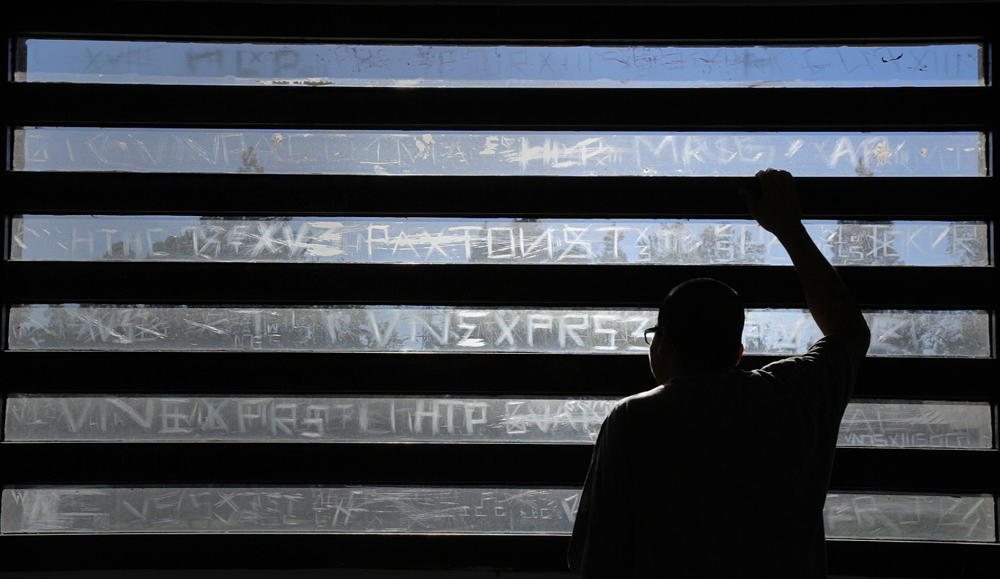During the making of the his first feature “They Call Us Monsters,” filmmaker Ben Lear asked Juan, Jarrad and Antonio, three of the young men he followed whether he might be able to see where they live after finishing their screenwriting class for the day. The guys were eager to oblige, taking him into what they jokingly referring to as “the honeymoon suite” during a tour of their living quarters “MTV Cribs”-style. In that moment, you know if nothing else they certainly have the imagination to be great screenwriters since what they’re describing is their cell at a juvenile detention facility.
“Even though this is a serious documentary about really serious subject matter, I’m not going to sacrifice any laughs,” said Lear, who might get that from his legendary father Norman. “If there’s a chance to get a laugh, I’m going to try to get it and not just for me the filmmaker, but for the boys because they’re [typically] so defensive and macho, [so] one of the straightest lines into their souls is their sense of humor and their intelligence.”
Those qualities are on display throughout Lear’s feature debut “They Call Us Monsters,” both inherently in its main subjects and the film itself, which illuminates the particularly cruel limbo faced by juvenile offenders who are subject to being tried as an adult for their crimes in California, a situation physically manifested in the waystation where Juan, Jarrad, Antonio and one other, Darrell, bide their time in a separate area of the Sylmar Juvenile Hall, awaiting their day in court.
As the film makes clear, these aren’t hardened criminals no matter what terrible acts they may be accused of committing, not yet old enough to have a full understanding of themselves let alone the impact of their actions on others, but still in some cases face the potential of life in prison. However, instead of letting their minds wander to the darkest recesses, “They Call Us Monsters” follows producer/director Gabriel Cowan as he begins to go out to Sylmar to turn that mental energy in the opposite direction, giving a rudimentary class in screenwriting to draw on their creativity, offer a respite from their incarceration and produce a film that will perhaps enable them to see their own potential.
While Lear offers up a compelling portrait of young men forced to grow up too quick, he also takes a probing, insightful look at a legal system with considerable growing pains of its own as frustration mounts on all sides from public defenders and probation officers to state legislators over fair treatment for juvenile offenders. The film made its triumphant debut at the Los Angeles Film Festival last night, and Lear spoke about how plans for a prison-set narrative project inadvertently led to his first documentary, keeping the focus limited to make the biggest impact and how making the film has affected him personally.
I had no intention of making a documentary. I was pursuing an idea for a narrative film that I had and my old family friend, Gabe Cowan, who was the teacher in the class, was helping me with that project. Through a mutual friend of ours, we met Scott Budnick, who produced all the “Hangover” movies, but was moonlighting as a juvenile justice crusader for a long time. Now he’s doing that basically full-time, and we met at the perfect time. He basically invited us to a number of different facilities in a span of 10 days. My intention was just to get inside of one of these places to see what it was like to be in a prison for research purposes, but when he took me into a writing class for juveniles that were tried as adults, I met these kids. I had never thought remotely about juvenile incarceration or the idea that juveniles would be tried as adults, so I just expected what I’ve seen in movies. I just couldn’t get over how young they were and how interested they were in learning about me and the world and most importantly, about themselves. Immediately, I had the kind of profound experience that you want to get out of a documentary.
That planted the seed and then around the same time, I learned about SB-260, so I felt here’s an opportunity to follow a piece of legislation that may or may not pass and if it does pass, will it give a second chance to the exact population of minors that I just met? If I could follow that bill and tell the story of these kids who the bill would affect, maybe there is a movie there.
It’s quite effective in the film how you meet the kids without knowing about their crimes. Did that actually mirror your own experience?
Absolutely. Really the whole purpose of the film was to mirror the experience that I had. You meet them and you have no context except what you’re told regarding the compound, but you know these kids are facing a lot of time for serious crimes. Beyond that, you know nothing and when you meet these kids, you don’t ask them right off the bat, “What are you accused of,” but if you build a rapport and get more and more comfortable, you can find that out and Gabe had never taught a class and hardly been in there before [we started shooting] so he was feeling those jitters and we all get to know them from scratch.
It must’ve been an interesting situation for you as a filmmaker where Gabe is teaching the class, but able to ask about the kids’ lives as it pertains to the writing of the screenplay. Would you actually talk to Gabe about where some of those conversations could go?
I don’t think I can ever know exactly what it would have been like had my camera not been there but we definitely made a concerted effort from the beginning to keep those things totally separate. He was going to teach the class how he was going to teach the class and I didn’t really have the authority to say, “Hey, can you make sure they talk about this or that?” Sometimes, it came up but I didn’t have that agenda. I was just interested in the class as a vehicle by which I could get to know them while they’re exploring their own stuff. For Gabe, the intention was really, “Let’s write the best movie that we can” and the kids really latched on to that. To their credit and also to the film’s benefit, they wanted to tell something that was very real and authentic and the only way to do that – as they learned begrudgingly – was to open up and get vulnerable.
You actually intersperse clips from “Los,” the film they write, into “They Call Us Monsters” – was the actual production of that something that was connected to the fact you were making this film?
That was always the intention of Gabe’s class. He was always like, “I want to go in there and teach a class for these kids [where we] collaborate and I will go out and rally these resources together and make the film, so that they could see something they’ve accomplished. I don’t know at what point I, the documentary filmmaker realized, “Holy shit, the footage of this film could be very interesting,” but that was a very exciting prospect for me.
Something happens early in the film, which I don’t want to spoil since it’s quite a powerful moment, but the makeup of the class changes dramatically. Did it come as a surprise to you?
What it did for us and hopefully for audiences was set up the idea that nothing is stable, nothing is guaranteed and this big unknown that they’re all headed for is pretty scary. They’re going to the big house. Literally in some cases, they’re going to be transferred to adult jail on their 18th birthday. That has to be lingering in the back of their minds at all times.
Was it difficult to gain access just to film inside the juvenile facility?
To probation’s credit, they were very onboard from the beginning. I suppose they were ready to tell their story or do something positive like this. Now, I think they’re more tentative, waiting to see how this film is perceived when it comes out to determine if they like to keep letting people film in there, but I’m really grateful to have been that guinea pig.
Getting permission to film the kids themselves was the major challenge because not only are they minors, but they’re incarcerated minors awaiting their trials so there were just so many potentially sensitive factors and so many people that we have to reach out to to gain that access, including their parents, their lawyers, and their judges. Getting those few approvals that we got ultimately was the first indication to me that this project was real.

I was focused on being honest and yet respectful towards the kids themselves and I definitely didn’t want to make a white savior film. I knew that randomly, it is still that because Gabe is our entry way into this world, but he wasn’t this perfect white savior, which I think it just made it a lot more interesting. Gabe did a really amazing job teaching these kids but yeah, he is human and he did get frustrated and he did piss them off. When he changed things in their script [at one point], and that was a moment where I saw how much Juan and Jarrad cared about this for the first time.
How much did you want to do outside the prison?
We had a very simple rule. Aside from the little quick bit from the legislative hall, everybody in the film had to be directly related to the boys, so even the judge you see turns out to be Jarrad’s judge and the lawyer is Juan’s lawyer. That was very important because I had no interest of doing the talking head/infographic-type of film.
You also bring in Yesenia Castro, one of the victims of one of the crimes. How did she come into the mix?
From the very beginning, I wanted to fully tell a victim’s side of the story as a main throughline and I got away from that idea for a lot of different reasons. When one of my producers Sasha Alpert came on board, not too far into the process, she said, “I think this project has a lot of potential, but one of the things you have to do is talk to a victim. With the amount of access and intimacy that you have with these boys, you can’t put this out without talking to one of their victims.”
That was definitely intimidating, but the reason it happened was because I think Yesenia recognized how rare, sadly, it is, for the victim’s voice to be heard. In the aftermath of violent crimes, specifically a murder, one of those voices is silent forever, so the only person you could turn towards for any meaning and any sense of closure or catharsis is the offender, [even] in attempted murders and other serious crimes because the victims retreat to their world. Yesenia got that and she wanted to tell her side of the story.

I come from a music background, which I was just getting ready to get away professionally and get into filmmaking, which is actually my first obsession, way back from middle school. But like I said, I didn’t plan on making a doc. There was something about this story and I don’t know if I’ll ever totally know what it was grabbed me and wouldn’t let go. The closest I can get to it is that moment in that juvenile hall, meeting these kids for the first time. I felt the connection. Having come from as different a background as you can possibly imagine with completely incomparable and unrecognizable struggles, there was something about their stepping into the unknown of adulthood and their hero’s journey – leaving their gangs and everything that’s comfortable and destructive behind – that deeply resonated with me. I felt like if these kids were able to make those breakthroughs and take on the possibility of spending a life in prison, I can take my little step forward in my life.
Of course, the L.A. Film Fest premiere is just the start of the journey for this film, but since it has such potential to lead to advocacy and activism. Are there plans to build that kind of campaign around it?
We are talking a lot about that and trying to figure out right now. I don’t know how much I can say concretely but what we really want to take the lessons that we learned about what California has done in terms of providing second chance opportunities to juveniles serving sentences and export that success to other states that are maybe not yet ready to have that conversation. A lot of our advocacy will be get the word out towards the rest of the country to catch them up.
“They Call Us Monsters” opens on January 20th in New York at the Village East Cinemas and January 27th in Los Angeles at the Laemmle Royal. A full list of screenings and dates is here.





